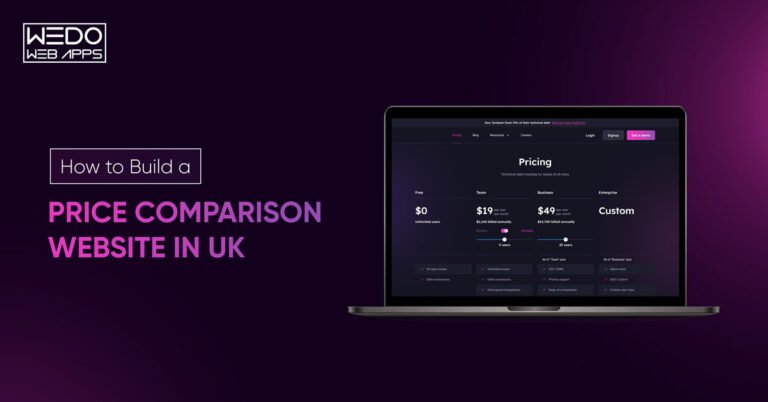22 Aug, 2023 | Web Development Company
How to Create a Price Comparison Website: Features, Steps and Cost

Understanding Price Comparison Websites
What are Price Comparison Websites? Price comparison websites, often referred to as comparison price websites or simply comparison websites, are online platforms that compare prices from various retailers to provide consumers with the best available rates for products or services. How Do They Work? These websites gather data from multiple online stores, consolidating product prices, descriptions, and reviews in one place. Algorithms then organise this information, presenting the user with a list of options based on their search.The Rise of Price Comparison Sites in the UK
The UK has witnessed a surge in the popularity of price comparison sites. This surge in demand stems from multiple factors.:- Consumer Empowerment: UK price comparison sites empower consumers to make informed decisions, giving them a sense of control over their purchases.
- Time and Cost Saving: Searching manually can be time-consuming. These sites streamline the process, making it efficient and effective.
- Variety: With listed price comparison websites, users have access to a wide range of products and services, ensuring they get the best deal.
Different Flavours: Types of Price Comparison Platforms
While some might think all comparison websites are the same, that’s far from the truth.- General Comparison Sites: Platforms like Price Comparison Website UK cover a wide array of products, from electronics to fashion.
- Food Comparison Websites: For the discerning gourmet or the budget meal planner, sites focused on food allow users to compare prices on groceries, takeaway meals, and more.
- Specialised Comparison Websites: These focus on niche markets, like insurance or holidays, and provide in-depth comparisons.
The Digital Shift: Price Comparison Apps
The modern consumer is always on the move, making mobile solutions more relevant than ever. Recognising this trend, the biggest price comparison sites have ventured into the mobile app world. A price comparison app offers the same services as its website counterpart but in a mobile-friendly format. In the UK, the demand for a price comparison app UK-based has seen a steady rise. This shows the nation's growing reliance on mobile solutions for shopping.How to Do a Cost Comparison: Tips for Using Comparison Websites Effectively
- Know What You Want: Before diving into the vast ocean of products, have a clear idea of what you're looking for.
- Cross-Check: It’s always a good idea to check multiple price comparison sites UK offers to ensure you’re getting the absolute best deal.
- Read Reviews: Most of these platforms also list reviews. Go through them to get an idea about the product's quality and the seller's credibility.
- Consider Other Costs: While the product might be cheaper on one site, factors like shipping and handling can increase the total cost.
Looking Ahead: The Future of Comparison Sites
The wave of digital advancement continues unabated. As technology evolves, so will comparison platforms. We might soon witness the integration of virtual reality, allowing users to "try" products before purchasing, or the use of artificial intelligence to predict and suggest products based on individual consumer behaviour.Selecting the Best: Key Features of a Top Price Comparison Website
When diving into the world of price comparison sites, knowing what features to look for can make a significant difference. Here's a checklist for evaluating the best comparison website:- User-friendly Interface: A simple, intuitive layout can make your comparison journey smooth and efficient.
- Broad Retailer Network: The more retailers a site collaborates with, the wider the product range and the better the chances of finding the best deal.
- Real-time Price Updates: Prices on the internet can change rapidly. The site should be able to reflect these changes promptly.
- Detailed Product Descriptions: High-resolution images, detailed specifications, and user reviews are essential for making informed decisions.
- Mobile Optimisation or App Availability: Given the increasing number of mobile users, a responsive site or a dedicated price comparison app is crucial.
- Transparent Fee Structures: Some sites might charge a fee or get a commission for referrals. Transparency about such charges is a mark of trustworthiness.
- Privacy Protection: With concerns about data privacy on the rise, the best sites will have robust security measures and clear privacy policies in place.

Niche Spotlight: Food Comparison Websites
One might wonder, why the need for a dedicated food comparison website when general price comparison websites are aplenty? Here's why:- Specificity: General websites might not have the granularity needed for different types of foods, brands, or organic vs non-organic distinctions.
- Varied Suppliers: A broader range of suppliers from supermarkets to local farmers ensures a better variety and quality.
- Freshness Factor: Unlike electronics or clothes, food items have an expiry date. Food-specific sites can factor in the freshness and recommend accordingly.
Dynamics Behind the Scene: How Price Comparison Sites Generate Revenue
Understanding the business model of price comparison sites can give consumers an insight into how they operate:- Affiliate Commissions: Most sites earn a commission for every sale made through their referral.
- Advertising: Some of the biggest price comparison sites offer advertising opportunities for retailers.
- Subscription Fees: Some premium comparison services might charge users a subscription fee for added features or benefits.
- Selling Data: Insights about shopping trends, though anonymised, can be valuable for market research and may be a source of revenue.
Our Thoughts: The Ethical Side of Price Comparison
While price comparison websites and apps have undeniably made life easier for consumers, it's essential to approach them with a holistic view. Always ensure you're not compromising on quality for price and remember to factor in the environmental or ethical impacts of your purchases. After all, being a smart consumer isn't just about saving money; it's about making choices that are sustainable and responsible. Learn the essential steps to building a successful price comparison website in the UK and connect with our website development services for professional guidance.Frequently Asked Questions
A price comparison website is an online platform that collates and presents prices from different retailers, allowing consumers to find the best available rates for products or services.
These platforms gather data from various online stores, consolidate product prices, descriptions, and reviews, and then use algorithms to organise and display this information based on user searches.
The main reasons for their popularity are consumer empowerment, time and cost savings, and the wide variety of products and services they cover.
No. While some offer general comparisons across many product categories, others, like food comparison websites, focus on specific niches.
The primary difference is the platform. While both offer similar services, a price comparison app is designed specifically for mobile users, offering a mobile-friendly interface and functionalities.
To use these sites effectively, know what you're looking for, cross-check prices on multiple platforms, read user reviews, and consider all associated costs, such as shipping.
While many comparison websites are free for users, some might earn a commission for every sale made through their referral. Others might offer premium services that come with a subscription fee.
Key features include a user-friendly interface, a broad retailer network, real-time price updates, detailed product descriptions, mobile optimisation, transparent fee structures, and robust privacy protection.
Food comparison websites offer granularity for different types of foods, a variety of suppliers, and often factor in the freshness of products, making them ideal for groceries and perishables.
Most earn through affiliate commissions, advertising, subscription fees, and potentially by selling anonymised shopping trend data.
While they offer a valuable service, it's essential for consumers to consider factors like product quality, environmental impact, and the ethical practices of manufacturers or sellers.

